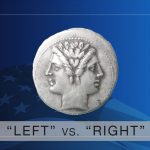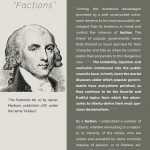Last Updated on October 3, 2021 by Constitutional Militia
Timothy Baldwin’s “A CONCURRING OPINION FOR SECESSION (Part 7 of 12)” raises a new issue as to which both he and I completely agree: namely, that the Supreme Court of the United States is not the sole and final judge of the constitutionality of a State’s resistance to usurpation and tyranny on the part of rogue public officials in the General Government. I have written several rather detailed and (I hope without being accused of self-promotion) scholarly books and articles to such effect on this point. So, “debating” the issue hardly seems worth an expenditure of verbal electrons. Nonetheless, Mr. Baldwin does make a few assertions on this general subject, as well as on various others, that warrant scrutiny at this juncture.
1. Mr. Baldwin asserts that
[s]overeignty is not a matter for a court. Moreover, the words “cases” and “controversies” especially did not mean the matter of state sovereignty. “Cases in law and equity arising under the Constitution” and “controversies” by definition do not mean the political powers possessed by an independent body- politic regarding matters that only sovereigns can determine.
In the first place, “sovereignty” is a matter for a court if the sovereign so declares. (In lawyers’ jargon, the sovereign may always waive “sovereign immunity”.) In America, the “sovereign” is We the People. Assuming for purposes of argument the validity of Mr. Baldwin’s contention that the Constitution is a “compact” among the States, it is beyond dispute that the People of the several States, in formulating their mutual “compact”, could have done whatever they wanted to do with their own sovereignty, including submitting legal questions relating to the States’ sovereign powers to a court established by them to act as their common judge. As the Declaration of Independence made clear, “it is the Right of the People * * * to institute new Government, laying its foundation on such principles and organizing its powers in such form, as to them shall seem most likely to effect their Safety and Happiness” (emphasis supplied). Who was then—or is today— to say the People nay? Mr. Baldwin invokes some “definition” that precludes litigation in “Cases” and “Controversies” with respect to “political powers”. But what “definition” is that? What does it say? What is its source? More to the point, what is its legal authority? What unstated “definition” drawn from some unnamed source outside of the Declaration of Independence and the Constitution can control the People’s power to organizing a new government, or the construction of the Constitution, in direct defiance of its explicit terms as handed down by the People themselves?
And not the Constitution alone on this score, either. For Mr. Baldwin seems not to have noticed that a common judge for the States was not a new idea in America, first broached out of the blue in Article III of the Constitution. No, indeed. The Articles of Confederation had earlier provided that “[t]he united states in congress assembled shall * * * be the last resort on appeal in all disputes and differences now subsisting or that hereafter may arise between two or more states concerning boundary, jurisdiction or any other cause whatever”. Article IX, ¶ 2. If the language “jurisdiction or any other cause whatever” is insufficient to embrace what Mr. Baldwin calls “the political powers possessed by an independent body-politic”, one wonders what language would be necessary.
But apparently Mr. Baldwin did not need to consult these examples from American history, inasmuch as he concurs with the fundamental point they make: namely, when he writes that “[p]olitical maxims of natural law confirm that states may retain the right to judge the constitutionality of third party actions regarding their sovereignty, where they have not granted such power to a third party court” (emphasis supplied). The only question, then, is what did the People provide in the Constitution with respect to these matters?
Assuming that the States are “independent bodies-politic” originally invested with a plenitude of “sovereignty”, the Constitution—through the mutual consent of the States themselves in their “compact”—directly and adversely affects “State sovereignty” and the States’ “political powers” in many ways. For example, Article I, Section 10, Clause 1 entirely strips the States of several important sovereign powers. Article I, Section 10, Clauses 2 and 3 preclude the States from exercising certain other sovereign powers “without the Consent of Congress”. Article VI, Clause 2 goes even farther along that road, by declaring that “[t]his Constitution, and the Laws of the United States which shall be made in Pursuance thereof, * * * shall be the supreme Law of the Land; and the Judges in every State shall be bound thereby, any Thing in the Constitution or Laws of any State to the Contrary notwithstanding” (emphasis supplied). And all public officials in the States are “bound by Oath or Affirmation, to support th[e] Constitution” in these particulars (as well as all others). Article VI, cl. 3. Thus, a mere statute enacted by Congress “in Pursuance” of the Constitution can override (absolutely nullify, if you will) even a State’s own constitution, and require all public officials in that State to recognize and even effectuate that nullification. Inasmuch as a State’s constitution is arguably the highest expression of her sovereignty, the States enjoy no sovereignty with respect to all of those matters that come within the legislative competence of Congress. So, given that the States agreed to this in their “compact”, what could or would have precluded them from also agreeing to submit legal issues relating to their sovereign powers to the Supreme Court? Nothing. Because the Constitution says in Article III that such is exactly what they did do. Indeed, matters under Article VI, Clause 2 relating to the supremacy of “Laws * * * made in Pursuance [of the Constitution]” over the States’ own constitutions and laws have often become the subjects of exercises of “the judicial Power [of the United States]” in “Cases, in Law and Equity, arising under this Constitution”. Article III, § 2, cl. 1. There are hundreds of such “Cases” in the collection of decisions of the Supreme Court known as the United States Reports, beginning in the earliest days of the Republic. Were all of these exercises of “the judicial Power” illegitimate (as Mr. Baldwin claims, “by definition”)? If not, then they (along with Article VI itself) surely disprove Mr. Baldwin’s contention that “[s]ince Congress cannot control state sovereignty through its laws, by necessity, the federal supreme court cannot control state sovereignty through its judgments”.
Returning to the specific issue of “secession”, let us posit a situation not too difficult for first-year law students in a “moot- court” class: The State of South Carolina plans to file suit against all of the other States within the original jurisdiction of the Supreme Court, seeking a ruling that she may “secede” from the Union on the basis of some theory that does not rely on Article V. The Attorney General of South Carolina is requested to provide his professional opinion as to whether such a suit is possible. He does so, as follows—First, he observes that “[i]n all Cases * * * in which a State shall be a Party, the supreme Court shall have original Jurisdiction”. Article III, § 2, cl. 2. He further observes that “[t]he judicial Power [of the United States] shall extend to all Cases, in Law and Equity, arising under this Constitution” and “to Controversies between two or more States”. Article III, § 2, cl. 1. He then observes that, as to a State, “Cases” and “Controversies” can mean the same thing, because the Constitution recognizes that there can be both “Cases * * * in which a State shall be a Party” and “Controversies between two or more States” in which of necessity those States are “Part[ies]”. He further observes that, because a State can be a “Party” in a “Case[ ]” in general, she can be a “Party” in a “Case[ ], in Law and Equity, arising under this Constitution” in particular. Finally, he concludes that, the question concerning “secession” which South Carolina seeks to raise being one that “aris[es] under this Constitution”, the State’s suit is valid; and because the suit involves States as “Part[ies]”, it may be prosecuted in the “original Jurisdiction” of the Supreme Court. Query: If the Attorney General were brought before the South Carolina Bar, could he be convicted of legal malpractice for giving this opinion? If not, then at least the Attorney General’s position is arguable—not, as Mr. Baldwin would have to contend, entirely without merit “by definition”.
2. Mr. Baldwin next argues “[t]hat the federal judiciary does not have power to hear cases in law or equity where the state is sued in its sovereign capacity is confirmed by the eleventh amendment: ‘The Judicial power of the United States shall not be construed to extend to any suit in law or equity, commenced or prosecuted against one of the United States by Citizens of another State, or by Citizens or Subjects of any Foreign State.’” I fear that, here, Mr. Baldwin has hoisted himself with his own petard.
Why was the Eleventh Amendment enacted? Because the Supreme Court had earlier ruled that, under the original Constitution, a State could be sued by “Citizens of another State”—that is, that a State enjoyed no “sovereign immunity” from such suit. Chisholm v. Georgia, 2 U.S. (2 Dallas) 419 (1793). Revealingly, at that time the States accepted this construction of the Constitution as correct, and requiring an actual amendment of the Constitution to change. Thus, rather than proving Mr. Baldwin’s contention that “the federal judiciary” never had “power to hear cases in law or equity where the state is sued in its sovereign capacity”, the Eleventh Amendment proves the very opposite. Moreover, the Eleventh Amendment explicitly applies only to suits brought by “Citizens of another State, or by Citizens or Subjects of any Foreign State”. It does not apply to suits brought by one State against another State. Plainly, if before the Eleventh Amendment was ratified “the judicial Power” of the United States extended even to suits brought by individuals against States, it certainly extended to suits brought by States against States, inasmuch as, unlike the former situation in which the parties are of unequal status, in the latter situation the parties are of equal status as “sovereigns”—and not only that, but as “sovereigns” who themselves had entered into a mutual “compact” to submit their disputes with one another to “the judicial Power” of the Supreme Court. Many “Cases” illustrate this point. For example, New Jersey v. New York, 30 U.S. (5 Peters) 284 (1831); Rhode Island v. Massachusetts, 37 U.S. (12 Peters) 657 (1838); South Dakota v. North Carolina, 192 U.S. 286 (1904); Kansas v. Colorado, 206 U.S. 46 (1907); Virginia v. West Virginia, 220 U.S. 1 (1911); Kentucky v. Indiana, 281 U.S. 163 (1930); Pennsylvania v. West Virginia, 262 U.S. 553 (1923); New Jersey v. New York, 283 U.S. 336 (1931).
Rhode Island v. Massachusetts is particularly pertinent, in that the Court in that case explicitly rejected Mr. Baldwin’s argument that, because the Constitution does not extend “the judicial Power” to all “Controversies” (as it does with respect to “Cases”) therefore some “Controversies” may be excluded from the reach of that power. 37 U.S. (12 Peters) at 721. Thus, Mr. Baldwin is plainly wrong to conclude that “[t]his omission [of the word ‘all’ with respect to ‘Controversies’] shows that the states did not concede to making the supreme court the ‘common judge’ over matters involving their sovereignty”. The issue was raised in a case involving two States as parties, decided adversely to Mr. Baldwin’s view, and never raised again, although numerous cases in which one State sued another came to the Supreme Court.
3. Mr. Baldwin complains that “[e]ven if the US S CT ruled that Congress’ power to do this or that encroached upon state sovereignty, what power does this give to the States? It gives no power at all.” Actually, it gives the power of a legal determination which, one would hope, other public officials in the General Government would feel obliged to follow, in fulfillment of their “Oath[s] or Affirmation[s], to support th[e] Constitution”. Article VI, cl. 3. Certainly, having a legal determination in one’s favor is better than having no legal determination at all.
True enough, an opinion of the Supreme Court (as Mr. Baldwin writes) “has no force or compulsion attached. Only executives can carry out laws.” And if rogue officials in the Executive Branch of the General Government, as well as rogue Congressmen, refused to implement the Supreme Court’s decision in favor of the States, then the States themselves would have to turn to direct action ex necessitate. That action, however, would be directed towards enforcing the Court’s decision within and for vindication of the Constitution. It would not be an exercise in “secession”, or even in “interposition” or “nullification”.
4. Mr. Baldwin then argues that,
[e]ven assuming that the US S CT attempted to maintain the lines of sovereignty, this does not address cases where it is not possible to make specific accusations against the federal government’s encroachments. Are individual states left to suffer until three fourths of the states amend the constitution? This is nonsense. The states can do what our founders did in the declaration of independence, using their inductive and deductive reasoning regarding the federal government’s intent “to reduce [us] under absolute despotism.” This is the natural right of every body-politic.
But if it were truly “not possible to make specific accusations against the federal government’s encroachments”, how could one fairly claim that there were any “encroachments” at all? What valid conclusions can follow from no evidence? In that event, what possible reason could exist for seeking to amend the Constitution? And what justification in law, morality, or prudence could possibly be cited for the extraordinary, extreme, and possibly disastrous step of “secession”? Is this how Mr. Baldwin operated when he was (as his biography tells us) a “Felony Prosecutor in the 1st District of Florida”—or was he always sure that he could make “specific accusations”, supported by competent evidence beyond a reasonable doubt, against those whom he prosecuted? Is it conceivable that, in answer to motions to dismiss indictments for failures to allege the commission of a crime, he responded with nothing more that “[t]his is nonsense”? And is the prosecution of a petty crime involving a single individual as serious a matter as “secession”, which could throw a State or even the entire country into armed conflict?
As I read the passage quoted immediately above, Mr. Baldwin asserts the astounding claim that the Founding Fathers “seceded” from Great Britain without making “specific accusations” against King George III and his ministers, and that on the basis of this precedent the States may “secede” without “specific accusations” today. The Declaration of Independence, though, compiled a long list of quite “specific accusations”—precisely for the purpose of “prov[ing]” the King’s malfeasance by “let[ting] Facts be submitted to a candid world”. The Founders did not concede that they were unable “to make specific accusations” but that, invoking some “natural right of every body-politic”, they were nonetheless entitled to “secede” from Great Britain and launch a long and sanguinary war that they came within an ace of losing. Rather, they recognized that “a decent respect to the opinions of mankind require[d] that they should declare the causes which impel[led] them to the separation”.
Under the principles of the Declaration of Independence, “secession” would be justified today if a State could marshal sufficient evidence of usurpation and tyranny on the part of the General Government (or, perhaps more properly under the “compact” theory of the Constitution, on the part of three- fourths of the States through the General Government). But Mr. Baldwin contends that “secession” is proper even if “it is not possible to make specific accusations” against anyone. If, however, “specific accusations” cannot be had, because evidence is lacking, then his claim that “secession” is in order is neither verifiable nor falsifiable. That being so, his argument must be dismissed as unscientific (if not totally nonrational).
5. Finally, Mr. Baldwin writes that “[p]erhaps there was a time for the use of the courts as the most peaceful means of redress available. But at some point, prudence demands more than begging for justice at the foot of the king and his agents.” There was a time? When was that? When did any State ever attempt to “secede” through the procedures of Article V? When did any State ever attempt to “secede” by bringing a “Case[ ], in Law [or] Equity, arising under th[e] Constitution” in the “original Jurisdiction” of the Supreme Court. I am aware of no such instance.
So, are we now to conclude that these alternatives can be disregarded precisely because they have never been tried? Worse yet, are we to consider it prudent for a State to leap into the utter darkness of the abyss of “secession” simply to avoid “begging for justice at the foot of the king and his agents”? Surely one must hear in this recommendation, not the counsel of Prudence, but the voice of Pride—the selfsame Pride that, utterly heedless of Prudence, set in train the wave of “secession” that eventually led to Sherman’s fiery march though Georgia and the Carolinas, Sheridan’s devastation of the Shenandoah Valley, and a thousand other destructive and deadly events.
One would hope that people trained in law could devise a better plan than that. For part eight of twelve click below.



































